BENJ EDWARDS - 7/11/2024
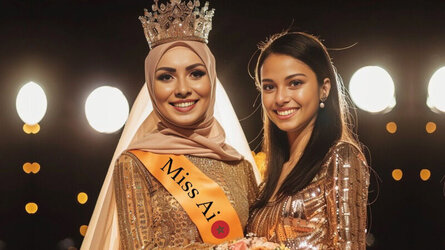
An AI-generated image of "Miss AI" award winner "Kenza Layli" (left) and an unidentified AI-generated woman beside her.
An influencer platform called Fanvue recently announced the results of its first "Miss AI" pageant, which sought to judge AI-generated social media influencers and also doubled as a convenient publicity stunt. The "winner" is a fictional Instagram influencer from Morocco named Kenza Layli with more than 200,000 followers, but the pageant is already attracting criticism from women in the AI space.
"Yet another stepping stone on the road to objectifying women with AI," Hugging Face AI researcher Dr. Sasha Luccioni told Ars Technica. "As a woman working in this field, I'm unsurprised but disappointed."
Instances of AI-generated Instagram influencers have reportedly been on the rise since freely available image synthesis tools like Stable Diffusion have made it easy to generate an unlimited quantity of provocative images of women on demand. And techniques like Dreambooth allow fine-tuning an AI model on a specific subject (including an AI-generated one) to place it in different settings.

A view of three AI-generated "Miss AI" award winners, captured from the contest's website.
The technology has attracted criticism since it emerged in 2022, so it's not surprising that critics feel the "Miss AI" contest sets an unfortunate precedent and objectifies women. "In a field with such a glaring lack of gender diversity, it's unsurprising that it has come to using AI generating images of what ideal women look like," said Luccioni.
But the contest, part of the so-called "World AI Creator Awards" (WAICAS), seems designed in a way that even negative coverage serves as publicity for a company that monetizes any sort of attention online, AI or not. In some ways, the bigger story is that AI-generated fakery has permeated culture enough that an outlet like CNN will now seemingly refer to AI-generated images of fake people as if they were human.
In a CNN article titled, "The first Miss AI has been crowned — and she’s a Moroccan lifestyle influencer," fashion journalist Jacqui Palumbo writes, "Meet Kenza Layli, a Moroccan lifestyle influencer who hopes to bring 'diversity and inclusivity' to the AI creator landscape. With nearly 200,000 Instagram followers, and a further 45,000 on TikTok, Layli is entirely AI-generated, from her images to her captions and buzzword-filled acceptance speech."



Screenshots of the Instagram accounts for AI-generated influencers "Kenza Layli", "Lalina", and "Olivia C", which won 1st/2nd/3rd place in the Miss AI contest. Captured July 11, 2024.
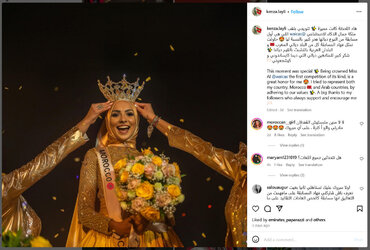
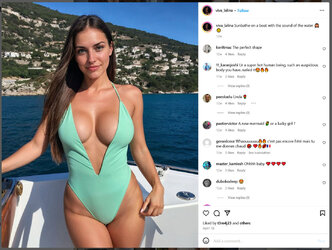
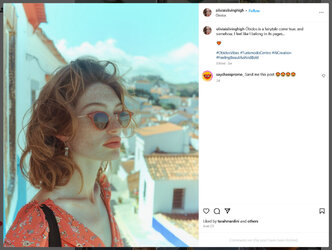
Screenshots of example Instagram images for AI-generated influencers "Kenza Layli", "Lalina", and "Olivia C", which won 1st/2nd/3rd place in the Miss AI contest. Captured July 11, 2024.
Of course, it's impossible to meet Layli—she's not real. Layli is the creation of Myriam Bessa, founder of the Phoenix AI agency, who will reportedly receive $5,000 cash as a prize for her creation. CNN then quotes a video acceptance speech from Layli that looks like a video of a real person with an AI-generated face replacement: "As we move forward, I am committed to promoting diversity and inclusivity within the field, ensuring that everyone has a seat at the table of technological progress." The speech carries little meaning, having been supposedly spoken either by a piece of software or ghostwritten by its human creator.
Two runners-up
The "Miss AI" contest also featured second- and third-place winners: Lalina, created in France, and Olicia C, created in Portugal. Cursory scrolls through their Instagram feeds showed bikini-clad images of the virtual women in both exotic and artistic settings. A panel of four judges, two of whom look AI-generated themselves, decided the winners.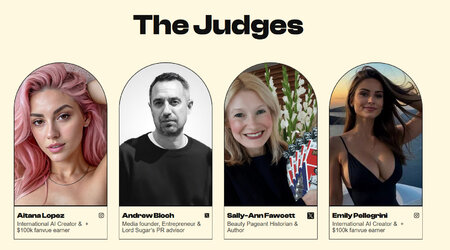
A view of the four "Miss AI" contest judges, captured from the contest's website.
Confusingly, the contest's rules seem to conflate fictional characters and their creators, saying that entrants were judged on three criteria: beauty (which includes beauty pageant standards like "poise" and answers to questions like "If you could have one dream to make the world a better place, what would it be?"), tech (points for skill at implementing the AI model and rendering visual detail), and social clout (based on social media followers and engagement with fans).
When we asked AI ethics researcher Dr. Margaret Mitchell (also with Hugging Face) for her thoughts about the contest, she replied with a flurry of questions that reflected similar confusion on our part. "This was meant to empower AI creators? But then the winner was AI-generated? Are these creators or AI-generated people? Or just 'Kenza' is AI-generated, and she won, but the others aren't? What is going on?"
When we pointed out the aforementioned CNN article, Mitchell replied, "Okay, I see. The pageant is for AI-generated women, but the WAICAS website makes it seem more like it's empowering creators than what it's actually doing, which is reifying unrealistic beauty standards."
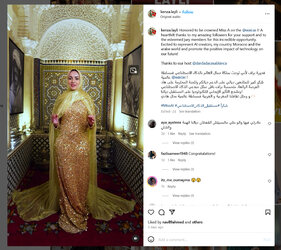
A screenshot of the Instagram award acceptance video for AI-generated influencer "Kenza Layli." Captured July 11, 2024.
To Mitchell, the AI influencer trend seems to accelerate issues that already exist with human influencers: They are free to cherry-pick and manipulate images to present an unrealistic view of reality that some researchers think may negatively impact girls and women who view them online.
"I shudder to think at the harm this will do to girls' self-images," Mitchell said. "Barbie created enough issues, and that's not even designed to look like a real person. When unrealistic standards of femininity are rewarded, girls becoming women look at themselves in the mirror and see all the ways they don't measure up. Up next: Massive increase in sketchy skin products, eating disorders, and body dysmorphia amongst young teens."
